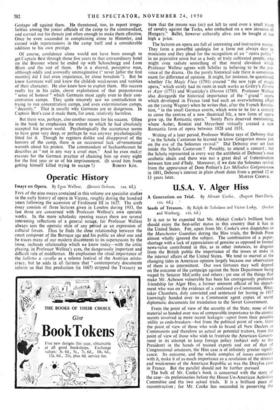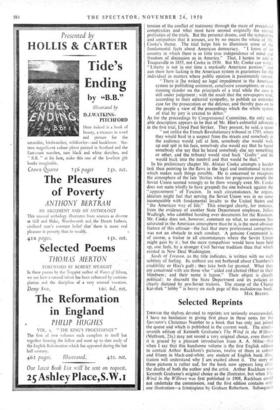U.S.A. V. Alger Hiss
A Generation,on Trial. By Alistair Cooke. (Rupert Hart-Davis.
125. 6d.)
IT is not to be expected that Mr. Alistair Cooke's brilliant book should enjoy the best-seller status in this country that it has in the United States. For, apart from Mr. Cooke's own dispatches to the Manchester Guardian during the -Hiss trials, the British Press almost wholly ignored the subject. The combination of a paper- shortage with a lack of appreciation of genuine as opposed to formal news-value contributed in this, as in other instances, to disguise from the British public the importance of the issues at stake in the internal affairs of the United States. We tend to marvel at the changing tides in American opinion largely because our observation of them is so intermittent. Our own fortunes may well depend on the outcome of the campaign against the State Department being waged by Senator McCarthy and others' yet one of the things that make Mr. Acheson vulnerable has been his courageously professed friendship for Alger Hiss, a former eminent official a his depart- ment who was on the evidence of a confessed ex-Communist, Whit- taker Chambers, duly convicted and sentenced for having in 1937 knowingly handed over to a Communist agent copies of secret diplomatic documents for translation to the Soviet Government.
From the point of view of the security of the State, none of the material so handed over was of comparable importance to the atomic secrets involved- more recent leakages—apart from their possible utility as code-breakers—but from the political point of view, from the point of view of those who wish to brand all New Dealers as Communists and therefore as actual or potential traitors, from the point of view of those who wish to frustrate the American Govern- ment in its attempt to keep foreign policy (subject only to the President) in the hands of trained experts and out of that of Congressional amateurs, the Hiss case is of infinitely greater signifi- cance. Its outcome, and the whole complex of issues connected with it, make it of as much importance as a revelation of the stresses and weaknesses of the American Republic as was the Dreyfus case in France. But the parallel should not be further pursued The bulk of Mr. Cooke's book is concerned with the story of the case—its preliminaries before the House Un-American Activities Committee and the two actual trials. It is a brilliant piece of reconstruction ; for Mr. Cooke has succeeded, in preserving the tension of the conflict of testimony through the maze of procedural complexities and What must have seemed originally the eternal prolixities of the trials. But the personal drama, and the sympathies and antipathies that it arouses, are by no means the whoie of Mr. Cooke's theme. The trial helps him to illuminate some of the fundamental facts about American democracy. "I know of no country in which there is so little true independence of mind and freedom of diseussion as in America." .That, I hasten to add is Tocqueville in 1835, not Cooke in 1950. But Mr. Cooke can write: "Liberty is not in our time a markedly American passion," and can show how lacking is the American system in guarantees for the individual in matters where public opinion is passionately roused.
"There is [he writes] no legal impediment in the American system to publishing comment, conclusive assumptions, or even running slander on the principals of a trial while the case is still under judgement ; with the result that the newspapers tend, according to their editorial syrripathy, to publish an extended case for the prosecution or the defence, and thereby pass on to the people a view of the proceedings which the whole system of trial by jury is created to debar."
As for the proceedings by Congressional Committee, the only suit- able description appears to be that of Mr. Hiss's colourful advocate . in the first trial, Lloyd Paul Stryker. They present, he said, a scene "not unlike the French Revolutionary tribunal in 1793, where they wOuld haul in a suspect from the streets and somebody in the audience would yell at him, somebody else would walk up and spit in his face, somebody else would say that he heard somebody else say that he heard somebody else say something or other, and the tribunal would read back ` Guilty ' and he would back into the tumbril and that would be that."
In his preliminary chapter Mr. Alistair Cooke attempts a harder task than pointing to the flaws in the legal and institutional system which makes such things possible. He is concerned to recapture the atmosphere of the late 'thirties when for progressive people the Soviet Union seemed wrongly to be (how wrongly even Mr. Cooke does not seem wholly to have grasped) the one bulwark against the " appeasenient " of Fascism. In such circumstances, he argues, idealists might feel that serving the Soviet Union was in no sense incompatible with fundamental loyalty to the United States and "the American way of life." This emerged clearly, for instance, from the evidence of another State Department employee, Julian Wadleigh, who addlitted handing over documents for the Russians. Mr. Cooke does not, however, comment on what, to someone less saturated in the American atmosphere than he is, is the most obvious feature of this attitude—the fact that mere professional correctness was not an obstacle to such conduct. A genuine Communist is. of course, a traitor in all circumstances where the Soviet Union might gain by it ; but the mere sympathiser would have been held up, one feels, by a stronger Civil Service tradition than that which existed in New .Deal Washington. .
Seeds of Treason, .as- the title indicates, is written with no such subtlety of feeling. Its authors are not bothered about Chambers's credibility or Hiss's guilt ; they take both for granted. What they are concerned with are those who "aided and abetted (Hiss) in their blindness ; and their. name is legion." Their object is clearly political : to discredit the State Department and its policies. as clearly dictated by pro-$oviet traitors. The, stamp. of the Chiang Kai-shek " lobby " is heavy on each page of this malodorous book.
MAX BELOFF.















































































 Previous page
Previous page